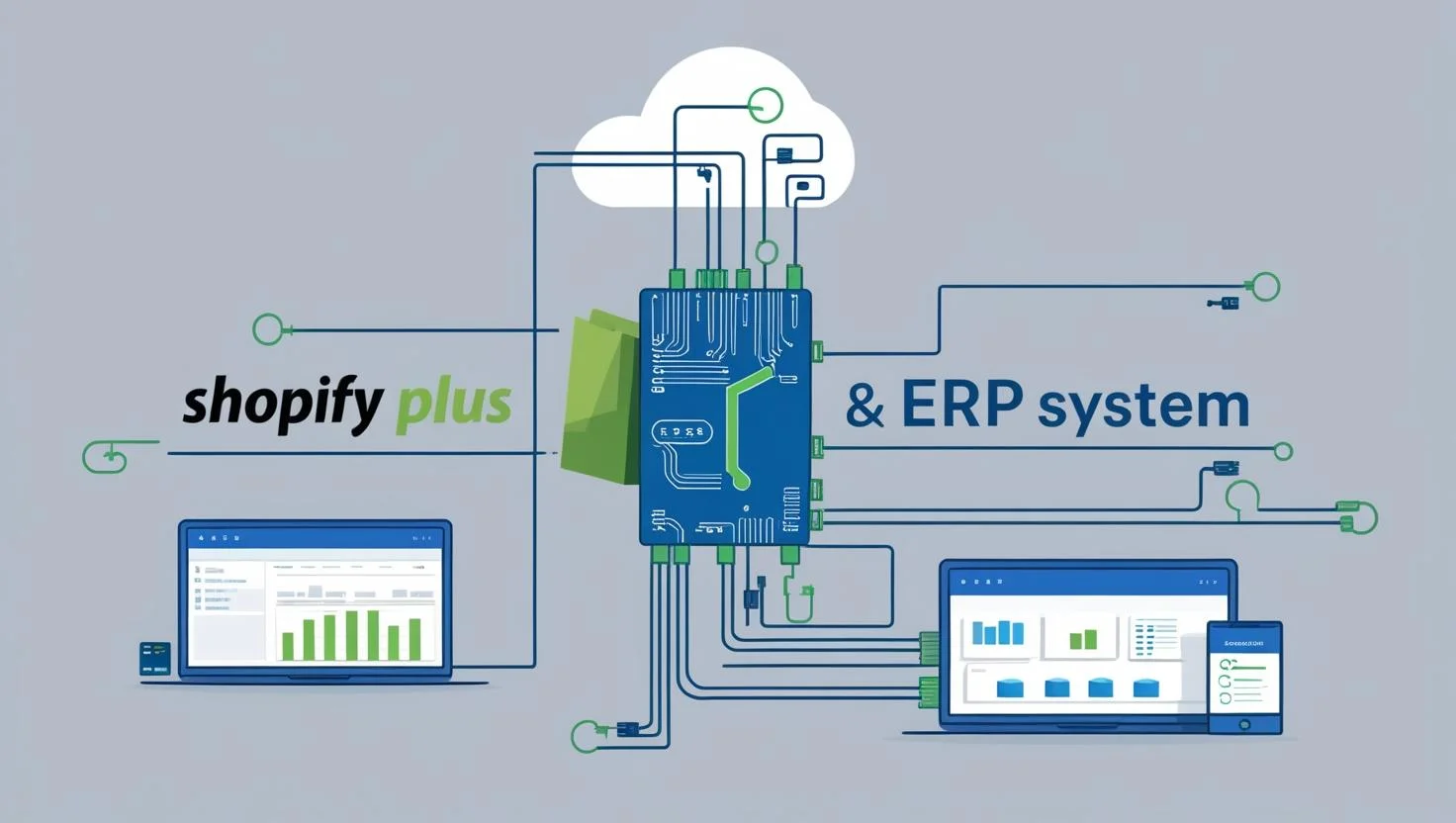January 21, 20257 min read


By Safwan
January 21, 20257 min read
Get in touch with our team to discuss your Shopify development needs.
Lets TalkIntegrating an Enterprise Resource Planning (ERP) system with Shopify Plus is a strategic move that can significantly enhance operational efficiency for growing e-commerce businesses. However, this process is not without its challenges. As a Shopify Plus agency, we understand that seamless Shopify ERP integration is crucial for synchronizing various business functions, including inventory management, order processing, customer data, and financial reporting.
One of the primary challenges in Shopify Plus integrations is ensuring real-time data synchronization between the ERP system and the Shopify Plus platform. Discrepancies in data can lead to issues such as overselling, stockouts, and inaccurate financial reporting.
Customizing the integration to fit unique business processes requires a deep understanding of both systems. This is where the expertise of a Shopify Plus agency becomes invaluable. We can tailor the integration to meet specific business needs, ensuring that the ERP system and Shopify Plus work in harmony.
This article dives into the challenges of integrating ERP systems with Shopify Plus and offers practical strategies to overcome them.
Let’s say you run a growing Shopify Plus store. Orders are flowing in, inventory is moving, and customers are happy. But behind the scenes, your team is buried in spreadsheets, manual data entry, and hopping between systems to keep everything in sync.
Sound familiar?
That’s where Shopify ERP integration steps in — to simplify, streamline, and scale.
ERP (Enterprise Resource Planning) software helps businesses manage core operations like:
Think of it as your business’s control center. Now, imagine connecting that control center directly to your Shopify Plus store. That’s what ERP Shopify integration is all about.
Without integration, you’re juggling platforms. With integration, your business runs smoother, faster, and smarter.
Here’s what you get when you connect Shopify ERP:
It eliminates manual work and lets your systems talk to each other.
Built specifically for your business needs, custom integrations offer full flexibility and control over how Shopify Plus communicates with your ERP.
These are pre-built connectors provided by ERP vendors or apps, allowing quick and easy integration with Shopify Plus with minimal setup.
Integration Platform as a Service (iPaaS) tools act as middleware, connecting Shopify Plus with your ERP through cloud-based automation and minimal code.
While integrating your Shopify ERP system can significantly boost efficiency, it’s not always plug-and-play. Let’s explore the common challenges businesses face when setting up Shopify Plus integrations—and why working with a reliable Shopify Plus agency can make all the difference.
Connecting Shopify Plus with an ERP means syncing various data points—like orders, customers, products, inventory, shipping, and financials. But not all systems structure data the same way. Mapping fields correctly between Shopify and your ERP is a major hurdle and can result in data mismatches or duplication if not handled properly.
One of the key benefits of ERP integration is real-time updates, but achieving that is easier said than done. Delayed syncing between Shopify and the ERP can lead to overselling, inaccurate inventory, or fulfillment errors. Ensuring real-time communication between systems is often a challenge, especially without the right middleware or custom development.
Every ERP system is different. Some have strong native Shopify connectors, while others require deep customization. This lack of standardization means your integration strategy has to be carefully planned and tailored, especially if you’re using a lesser-known or industry-specific ERP.
Custom Shopify Plus integrations often involve a significant investment, both in terms of time and money. And it doesn’t stop at the initial build. Ongoing maintenance, updates, and troubleshooting are necessary to keep everything running smoothly, which can add to long-term costs.
As your store grows, your integration needs evolve. If your ERP integration isn’t designed to scale with order volume or product data, it could slow down performance, causing lags or breakdowns in critical business processes.
Many in-house teams do not have the technical know-how to handle ERP integration at an enterprise level. That’s why partnering with a seasoned Shopify Plus agency becomes crucial—they bring the tools, experience, and strategic approach needed to deliver a seamless integration.
Tackling Shopify ERP integration challenges doesn’t have to feel overwhelming. With the right strategies in place, your Shopify Plus integrations can run smoothly and scale with your business. Here’s how to stay ahead:
Before diving into development, map out your integration needs in detail. Define which data needs to sync (orders, inventory, customers, returns, etc.), how often, and in which direction. Having a clear blueprint avoids confusion later and sets a strong foundation for the integration process.
Select the integration method that best fits your business: custom integration for full control, native connectors for simplicity, or iPaaS solutions for flexibility and scalability. The right choice depends on your ERP system’s capabilities and your internal team’s technical expertise.
Partnering with a specialized Shopify Plus agency can save you time, cost, and frustration. These experts understand both Shopify’s infrastructure and ERP systems, helping you avoid common pitfalls and build a future-ready solution. They can also assist in testing, deployment, and post-launch support.
Integrations should include built-in error handling and retry mechanisms. Whether you’re syncing inventory, orders, or shipping data, real-time updates with fallback plans ensure your store operations stay uninterrupted even if there’s a temporary sync issue between Shopify ERP and your backend systems.
As your store grows, so does your data. Design your Shopify Plus integration to handle large volumes of orders, product variations, and customer data. Whether it’s through batch processing, API rate limiting, or cloud infrastructure, scalability should never be an afterthought.
Test your integration in a staging environment before deploying it to your live store. Simulate order flows, inventory updates, refunds, and edge cases. A Shopify Plus agency can help create test cases to ensure your integration performs reliably under real-world conditions.
Integration isn’t a “set it and forget it” job. Regular monitoring and maintenance are key to long-term success. Use logging tools, alerts, and performance dashboards to keep track of data sync status and system health. Your Shopify Plus agency should offer post-launch support as part of your plan.
Integrating an ERP system with Shopify Plus isn’t just about syncing data—it’s about building a smarter, more scalable business. From streamlining operations to enhancing customer experience, a well-executed Shopify ERP integration gives your brand the agility and efficiency it needs to grow.
Yes, there are challenges. But with the right strategy—and the support of a skilled Shopify Plus agency—you can turn complexity into clarity and chaos into control.
If you’re ready to take your eCommerce operations to the next level, now’s the time to invest in a future-proof Shopify Plus integration that works as hard as you do.
Talk to our Shopify experts at CodingKart IT, and discover how the right strategy can streamline your operations, reduce manual work, and help your business scale faster.
Book a FREE consultation today to get expert advice tailored to your needs.
April 4, 202510 min read
Introduction Personalization has become a game-changer in eCommerce, allowing brands to offer tailored experiences that resonate with their customers. Shopify Plus provides advanced tools to ...Read More
March 26, 20258 min read
The checkout page is the most crucial part of your Shopify store—it’s where conversions happen. For Shopify merchants seeking to maximize conversions and provide a ...Read More
March 20, 20256 min read
In today’s fast-paced eCommerce landscape, Shopify CRM integration is essential for delivering a seamless and personalized customer experience. By integrating a CRM system with Shopify, ...Read More